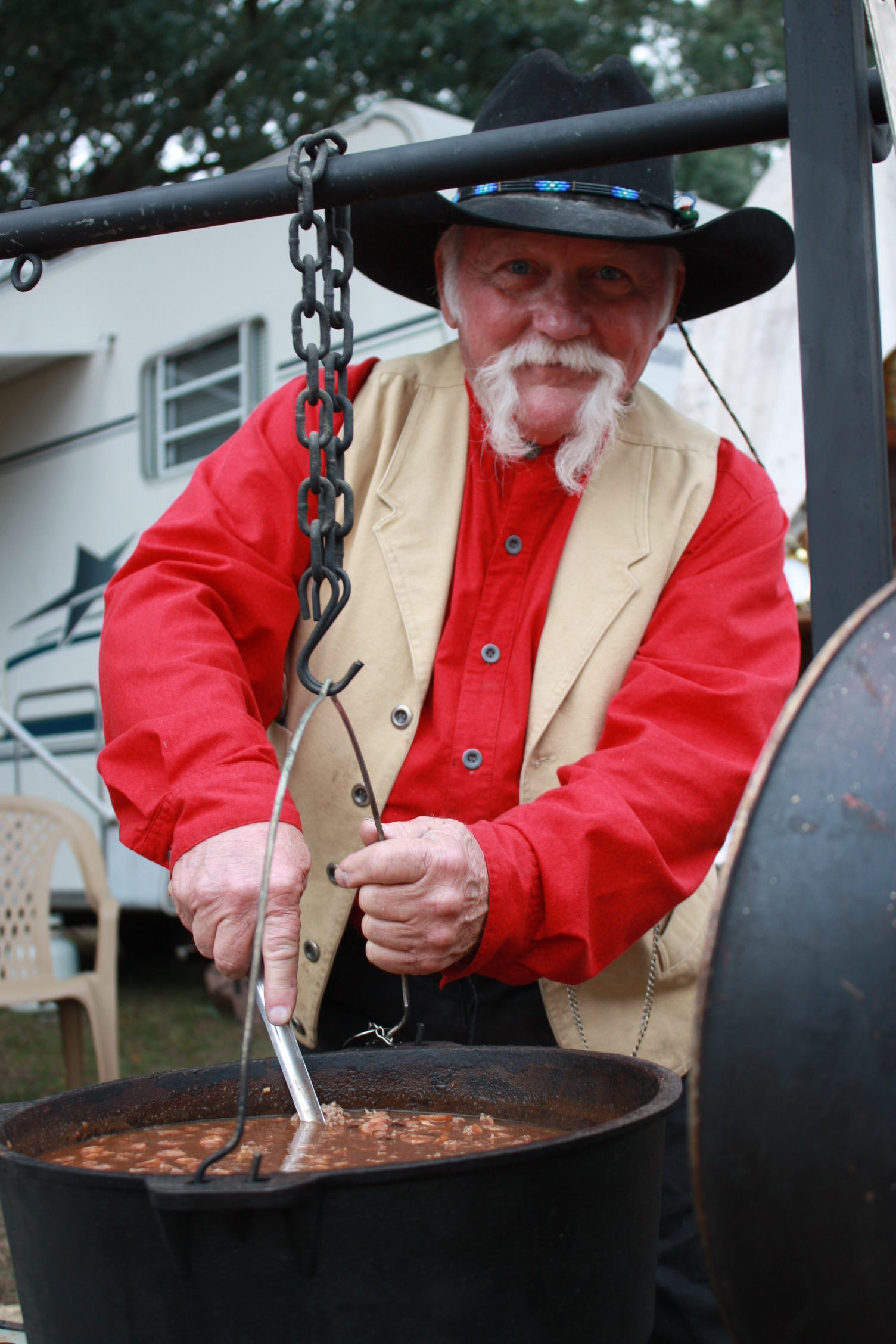
You slap a mosquito and it startles your horse. You give her a pat; she settles down. You look around for your dog and spot him herding a couple of stray cattle back to the herd. A half dozen more cattle have stopped for a drink, even though you led them across one of Florida’s many rivers not two hours ago. The Florida sun beats down. You pull your last piece of hardtack out of your saddlebag. It’s been nearly three days since you’ve had anything but leftover stew and old coffee. The hardtack is inedible. The coffee tastes like dirt and swamp water.
CRACK! CRACK! The characteristic cracks of another cowboy’s bullwhip over the next ridge are your buddy’s signal that it’s time to stop for dinner. The cook has soaked the beans and cooked up something delicious. You crack your whip, passing the message down the line. You and your fellow “cracker cowboys” will feast tonight.
It might be a scene from the mid-1800s, or it might be Michael Creel, Milton’s Cooking Cowboy. Creel, 62, built his own covered chuck wagon and gives cooking demonstrations at schools, churches, Boy Scout troops, and festivals in the true spirit of the old Florida cowboy.
“My favorite part of doing this is seeing the reactions on people’s faces when they see I can cook anything in a Dutch oven that they can cook in a conventional oven,” he says. “That’s the way they used to do it back in the 1800s.”
He can fix a variety of stews, drunk chicken, smoked pulled pork, spicy macaroni and cheese, black-eyed beans, potatoes with peppers and onions, and peach cobbler, all over coals on the ground. And yes, he can crack his bullwhips in the namesake noise of the Cracker Cowboys.
Creel was in his first rodeo at age eight and has competed in rodeos from South Florida to Iowa and Nevada.
“I am so proud of being a rodeo cowboy from the South, because when people say, ‘Where you from?’ you say, ‘Florida,’ what’s the first thing you think of? Tourism, beaches,” Creel laughs. “When you talk about redneck, you’re talking about us Cracker Cowboys that have lived the life! I’ve been a cowboy since the day I was born. This is something God put in my heart.”
Florida presented unique challenges to its cowboys with its many rivers and streams. A 10-hour day in the saddle might only move the herd 60 or 70 miles. But the state’s grassy plains were probably the first in the United States to host cattle. Ponce de Leon introduced Andalusian cattle—think: Texas Longhorn—to Florida in the 1500s. The Seminole nation herded the cattle across the state by the 1800s, and together with the Cracker Cowboys supplied the Confederate with beef and leather during the Civil War.
Creel especially enjoys the entwined history of the cowboys and Native Americans, and their much friendlier relationship than that of western cowboys and Indians. It’s important for people to know that, because it’s their heritage, he says. He himself counts many native Creek Indians as his friends today.
“They have embraced us, and that’s what the Southern lifestyle is all about: the Native Americans and the immigrants living together,” Creel says, then jokes, “I guess most people think Florida just started back like in the 1940s or 50s, but the state of Florida has been around since way back.”
That’s why Creel cooks up a pot of stew and passes out samples. It brings people together and provides an opportunity to learn about life as it was.
“Nobody has ever hated the food,” he says. “Everybody loves the food. You would be surprised at the children and young adults that come up and ask us questions, because they see that and they recognize it’s part of their American heritage.”
Kids frequently save their sample cups and ask for seconds. But the tasty stews weren’t everyday fare for the cowboys. They’d spend three or four days driving cattle herds, then stop for a day or two to rest, cook, and eat. That’s when the stews, cobblers and tarts came out. The cowboys ate a lot of bad food between good meals, Creel says.
As the New Year kicks off, Creel says a lot of his goals are the same as last year’s: “To educate as many people as I can about the Western heritage of the South and the love of the cowboy lifestyle I’ve been able to live the last 50 years that has brought me so many friends. There’s more to the state of Florida than just the beaches and the tourists. We are an agricultural state. That’s what I try to do every day.”
For more information on “Cowboy Creations and Cowboy Cooking,” call Michael Creel at 384-5385.
This article originally appeared on Santa Rosa Press Gazette: Cowboy Cooking: Santa Rosa’s link to the past
